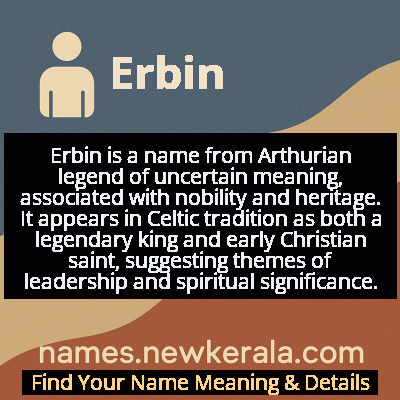Erbin Name Meaning & Details
Origin, Popularity, Numerology Analysis & Name Meaning of Erbin
Discover the origin, meaning, and cultural significance of the name ERBIN. Delve into its historical roots and explore the lasting impact it has had on communities and traditions.
Name
Erbin
Gender
Male
Origin
Arthurian
Lucky Number
3
Meaning of the Name - Erbin
Erbin is a name from Arthurian legend of uncertain meaning, associated with nobility and heritage. It appears in Celtic tradition as both a legendary king and early Christian saint, suggesting themes of leadership and spiritual significance.
Erbin - Complete Numerology Analysis
Your Numerology Number
Based on Pythagorean Numerology System
Ruling Planet
Jupiter
Positive Nature
Optimistic, inspirational, and creative.
Negative Traits
Scattered, exaggerating.
Lucky Colours
Yellow, gold, purple.
Lucky Days
Thursday.
Lucky Stones
Yellow sapphire.
Harmony Numbers
1, 2, 9.
Best Suited Professions
Arts, writing, communication.
What People Like About You
Creativity, optimism.
Famous People Named Erbin
Erbin of Dumnonia
Legendary King
Father of King Geraint in Arthurian tradition
Saint Erbin
Celtic Saint
Early Christian missionary in Cornwall and Wales
Erbin ap Constantine
Welsh Prince
Historical figure in Welsh genealogies
Name Variations & International Equivalents
Click on blue names to explore their detailed meanings. Gray names with will be available soon.
Cultural & Historical Significance
Beyond Arthurian literature, Erbin appears in Celtic hagiography as a 6th-century saint who established Christian communities in Cornwall and Wales. This dual significance—both legendary king and Christian saint—reflects the complex cultural transition from pagan Celtic traditions to Christianity in early medieval Britain. The name embodies the bridge between ancient British nobility and the emerging Christian culture, making it a symbol of cultural continuity during a transformative period in British history.
Extended Personality Analysis
Individuals named Erbin are often perceived as having a strong sense of heritage and tradition, reflecting the name's Arthurian and noble associations. They tend to be grounded, responsible figures who value family legacy and historical continuity. This manifests as loyalty to their principles, dedication to preserving important traditions, and a natural inclination toward leadership roles where they can guide and protect others. Their connection to the name's royal heritage often gives them an innate dignity and sense of purpose.
Erbins typically exhibit a balanced combination of practical wisdom and quiet strength. They are not flashy or attention-seeking but rather steady, reliable individuals who build lasting foundations. Their personality often includes a contemplative nature, possibly influenced by the name's saintly associations, leading them to be thoughtful decision-makers who consider long-term consequences. While they may not be the most charismatic individuals in a group, they earn respect through consistency, integrity, and their ability to maintain stability during challenging times.
Modern Usage & Popularity
In contemporary times, Erbin remains an exceptionally rare name, primarily used by families with strong connections to Celtic heritage or Arthurian enthusiasts. It has never appeared in popular baby name rankings and maintains its status as a distinctive, historical choice. Modern usage is largely confined to Wales and Cornwall, where there's renewed interest in traditional Celtic names. The name appeals to parents seeking unique names with deep historical roots and literary connections, though its obscurity means it's unlikely to gain widespread popularity. Recent trends show a slight increase in its use among families interested in reviving ancient British names.
Symbolic & Spiritual Meanings
Symbolically, Erbin represents inheritance, continuity, and the bridge between generations. The name evokes the passing of legacy and responsibility from father to son, as seen in the Arthurian tradition where Erbin's son Geraint continues his noble line. It also symbolizes the transition from pagan to Christian Britain, embodying cultural adaptation while maintaining core values. The name carries connotations of quiet strength, ancestral wisdom, and the importance of roots—suggesting that true power comes from understanding one's place in a larger historical narrative rather than seeking personal glory.

